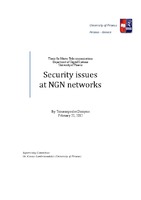Security issues at NGN networks

Master Thesis
Συγγραφέας
Τζουανόπουλος, Διονύσης
Ημερομηνία
2012-02-29Προβολή/
Θεματική επικεφαλίδα
Αρχιτεκτονική ηλεκτρονικών υπολογιστών ; Ηλεκτρονικοί υπολογιστές -- Δίκτυα -- Μέτρα ασφαλείαςΠερίληψη
The major security challenge of wireless networking and mobile communication is to protect network resources and secure end users. Additional security measures are required to cope with the interception of data on radio interfaces and illegitimate access to mobile services. The interception of user's data breaks the confidentiality of user's information and the illegitimate use of services cause masquerading and false charging the users. Security in next-generation networks (NGNs) is a formidable challenge for all the involved parties (researchers, vendors, and service providers) since NGNs are based on Internet Protocol (IP) network technology, which has demonstrated the potential for significant security vulnerabilities. The IP Multimedia Subsystem (IMS), defined by the 3rd Generation Partnership Project (3GPP) and 3rd Generation Partnership Project 2 (3GPP2) standards partnerships, is an important aspect of NGN evolution since it provides for access- independent advanced multimedia services in a distributed architecture. Its session control mechanism is based on Session Initiation Protocol (SIP) and employs many Internet Engineering Task Force (IETF)-defined protocols to provide a flexible, distributed network architecture for deployment of advanced consumer and business services. IMS security is a key enabler of large scale deployments of NGNs and must provide equivalent or better security than existing network solutions. In order to accomplish this goal, IMS security needs to be addressed in a comprehensive way to ensure that security needs are understood, standardized solutions are implemented, and security processes are in place to continually advance security as IMS evolves.


